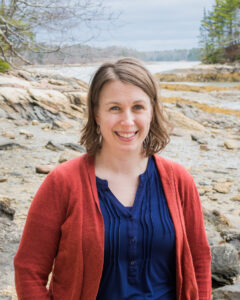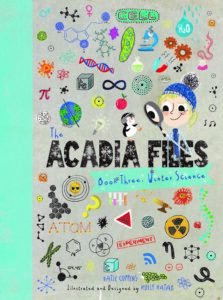
BRUNSWICK— As a mom and teacher, Katie Coppens is always trying to get her daughters and her students interested and connected with science, language and the world around them. Her Maine-based, Maine-published science-centric book series, The Acadia Files, is one way to accomplish that goal– even if her six-year-old daughter is mostly excited about the pink binding on one of her upcoming books and her students really just think its cool that their teacher’s work is available on Amazon.
The Acadia Files follow 10-year-old Acadia Greene as she uses science to navigate her world. There are four books in the series, with each book set in a different season. Coppens’ lasted book, “The Acadia Files Book Three, Winter Science” hits shelves Nov. 5. Book four, set in Spring, will follow in February.
Each chapter includes a different challenge that Acadia can solve through science, and ends with illustrations, science experiments and lingering questions in Acadia’s science notebook.
In the summer she uses the scientific method to discover who stole the blueberries from her blueberry bushes. In the fall, she learns about the immune system after sorting through Halloween candy and discovering her friend has a peanut allergy. In the winter, she will explore climate change and her carbon footprint after her snowman melts. Sledding with her friends helps her understand acceleration and friction. Other topics include molecular structure and neutral buoyancy, aerodynamics, animal survival in the winter and more.
Coppens, a Brunswick resident, is a science and English teacher at Falmouth Middle School. Her first book, “Creative Writing in Science: Activities that Inspire” was published through the National Science Teaching Association in 2016, and in some ways helped pave the way for a fiction science-based story.
“I think it helps kids learn about science in a way that they really internalize,” Coppens said about the combination of literacy and science. “There are lots of great non-fiction books that approach (science) in a way that’s very different than a traditional textbook that kids can look forward to reading. It helps them relate to it and helps them become better readers and writers.”

No matter what she’s doing, Coppens is “trying to get kids to ask questions and approach how kids can approach science and thinking.”
Her books combine her two passions of science and English, and she said her “teacher voice” comes through prominently in her writing.
One thing she did not expect though, was how much her writing changed after she became a mom.
“The idea (for the Acadia Files) came when my husband and I had our daughter. I was thinking about who she could be and the type of parents we wanted to be,” she said. “It was my vision for who we could be as a family.”
Her writing began to take on a mom voice to go with her teacher voice, and the family element of Acadia’s life began to take shape. Her dad is always making jokes and puns and there are deeper lessons about the ways we treat people, she said.
“I wanted to write a book that parents knew was a book they could feel good having their child read,” she said.
It was also important to Coppens that her book have a strong Maine focus. The book is set in the state, Acadia is named after Acadia National Park and even her dog, Baxter, is named after Baxter State Park. She went to Thomaston-based publishers Tilbury House right away.
Unlike some authors, Coppens does not struggle with writer’s block.
“Writing to me is like running for my husband,” she said. “It’s relaxing and fun, it’s a creative outlet.”
She writes for an hour every night after her children go to bed.
“It was the idea of having something that was my own, after being a teacher and mom,” and living for others, she said. “It was something I could create,” but that could also help children, she said, adding that from the get-go she knew she did not want the story to “live in my laptop.”
Now, she takes her books to schools and libraries across Maine and into New Hampshire, talking about the story and helping the kids conduct an experiment featured in the book. At the end of each visit the kids get their own science notebooks to write down “the things they wonder and the things they’re observing,” she said.
This is one of the best parts, she said, visiting children and hearing them say “Let’s think like Acadia.”
“They’re asking questions and seeking out knowledge,” she said.

Comments are not available on this story. Read more about why we allow commenting on some stories and not on others.
We believe it's important to offer commenting on certain stories as a benefit to our readers. At its best, our comments sections can be a productive platform for readers to engage with our journalism, offer thoughts on coverage and issues, and drive conversation in a respectful, solutions-based way. It's a form of open discourse that can be useful to our community, public officials, journalists and others.
We do not enable comments on everything — exceptions include most crime stories, and coverage involving personal tragedy or sensitive issues that invite personal attacks instead of thoughtful discussion.
You can read more here about our commenting policy and terms of use. More information is also found on our FAQs.
Show less